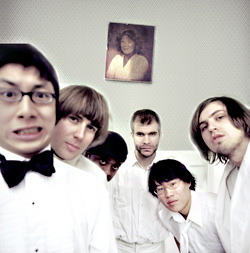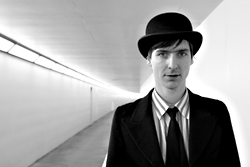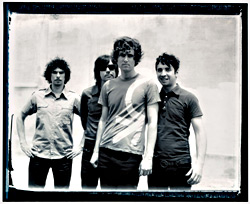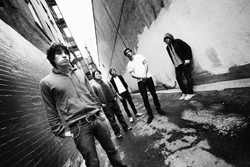A year and a half ago, pop fans throughout Indieville were saddened to discover that Unicorns—the quirky Montreal outfit that spent 2004 making a speedy transition from complete unknowns to underground sensations—no longer existed. Though the band offered little information about its demise (news of which originally broke via a series of cryptic single-line messages posted on the Unicorns Web site), this much is now clear: The breakup was as much of a bummer for frontman Nick Diamonds as it was for the group’s fan base.
“It was definitely a devastation,” Diamonds says via phone. “It was something that you enjoy doing, that’s a huge part of your life, ending. But the good thing about the triumph of the human spirit is that it prevails. And I guess we’ve come out as survivors.”
His survival boat? Islands, a new act headed by Diamonds and his old Unicorns bandmate J’aime Tambeur, who’ve just released an appealing debut called Return to the Sea (Equator) that picks up where the original outfit suddenly left off. At once looser and more straightforward than Unicorns’ celebrated Who Will Cut Our Hair When We’re Gone?, the album is a crazy patchwork quilt of psych-pop melodies, folk-rock jangle, string-and-horn sweetening, and woozy military-march rhythms. It also includes guest spots from members of Arcade Fire, Wolf Parade, and undie-rap MCs Busdriver and Subtitle.
Diamonds is still cagey about what led to the end of Unicorns. “We’re getting into gossip territory here,” he says when prodded for specifics. While various postmortem reports have attributed the breakup to familiar culprits (tour exhaustion, personality differences), Diamonds acknowledges that he and Tambeur had begun to conceptualize Islands fairly early on.
“I think J’aime and I knew that Unicorns was reaching its end,” he explains. “As unwarranted as we felt it was, we realized that it was coming to a close. And we knew that we had something together that we really valued and that we wanted to continue working together. We didn’t wanna stop playing music just because we were gonna lose the band. So we just kind of carried over. We started working on this new thing before the name Islands was attached to it.”
Between Unicorns’ dissolution and Islands’ official start-up, he and Tambeur also took a detour into hip-hop, forming Th’ Corn Gangg, a loose live project in which they had various MCs (including Return to the Sea‘s Busdriver and Subtitle) rhyme over retooled versions of old Unicorns songs. Despite the stylistic variety, Diamonds resists the compartmentalization of all this music. He considers the work part of a single continuum of ideas.
“For me, it’s just a reflection of who I am and what I’m doing,” the singer says. “The only distinguishing factor for me is growth and time. The passage of time, really, is the only marker that separates Islands and Unicorns. We’re still being natural. I’m still doing what I’ve always done. I’m either getting better at it or doing it in a different way because of the impressions that have been left on me by being alive,” he laughs. “You know, all that kind of existential stuff.”
Though the group now includes five additional members (all of whom joined after Return to the Sea was completed), Islands’ core is the partnership between Diamonds and Tambeur. The pair originally met in Montreal through mutual musician friends. Diamonds says they started playing together casually, then lived together as roommates. When Diamonds and fellow Unicorns principal Alden Ginger decided they needed a drummer “because there was too much to do with only two people,” the singer recruited Tambeur. “That’s when our real musical relationship formed,” Diamonds says, adding that their chemistry actually took a bit of time to establish itself. “There were parts where I was feeling threatened,” he explains. “Unicorns was a duo that was becoming a trio, and I was feeling like J’aime was encroaching upon our territory. It was just a weird transition for me. But once I got over that, it was magic.”
In the expanded Islands lineup, the encroaching continues. Diamonds says he doesn’t tell the other members of the band—Patrick Gregoire, Patrice Agbokou, James R. Guthrie, and brothers Alex and Sebastian Chow (plus or minus any number of other players at any given time)—what to play or how to play it. He’ll bring something he’s written to the group, then solicit input. “I don’t feel that I’m overly dictatorial,” he says, while admitting that with such a large group, the need does exist for someone to step into a leadership role. “That definitely wasn’t necessary with the Unicorns,” he laughs. “We’re more of a group than me backed by a bunch of guys. But, yeah, there’s a direction that I’m trying to persuade the others to follow me in.”
That spirit of open cooperation is becoming a kind of Canadian indie-rock cliché, I tell Diamonds. Broken Social Scene, Arcade Fire, Wolf Parade: In theory, at least, our neighbors to the north seem terminally uncomfortable with the notion of the typical rock band. “Yeah, I guess now that you mention it, there is a lot of camaraderie and collectivism in the music up here,” he says. “Maybe it’s something in the educational system.”








